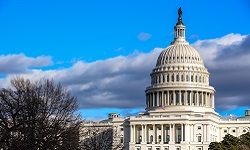 AAU Sends Letter Supporting Nasser Paydar’s Nomination as Assistant Secretary for Postsecondary Education
AAU Sends Letter Supporting Nasser Paydar’s Nomination as Assistant Secretary for Postsecondary Education
AAU President Barbara R. Snyder sent a letter to members of the Senate Health, Education, Labor and Pensions Committee in support of Nasser Paydar’s nomination as assistant secretary for postsecondary education at the Department of Education. The assistant secretary for postsecondary education provides overall direction, coordination, and leadership for federal higher education programs.
President Snyder writes that Paydar is a widely respected leader who had worked throughout his career to make “postsecondary education more accessible and affordable for all who seek education and training to advance their knowledge, skills, and careers.” Paydar was previously chancellor of Indiana University–Purdue University Indianapolis and executive vice president of Indiana University. President Snyder notes that Paydar is “eminently qualified” for the position and urges the HELP committee to favorably report his nomination “as soon as possible for consideration by the full Senate.”
 Hill Update: FY23 Appropriations, Competitiveness Legislation, and Reconciliation
Hill Update: FY23 Appropriations, Competitiveness Legislation, and Reconciliation
Congress returned to session this week with a full slate of issues on its agenda. Here are the most recent updates:
FY23 Appropriations: Top House and Senate appropriators, including Senate Appropriations Committee Chair Patrick Leahy (D-VT), Senate Appropriations Vice Chair Richard Shelby (R-AL), House Appropriations Committee Chair Rosa DeLauro (D-CT), and House Appropriations Ranking Member Kay Granger (R-TX), met yesterday to talk about FY23 spending bills. The four key appropriations leaders discussed defense and nondefense spending limits. Sen. Leahy told reporters afterward that the meeting was “excellent” and that he’s looking to come to a bipartisan, bicameral agreement on topline spending limits “in the next couple of weeks.”
Meanwhile, the House Appropriations Committee is planning to take up FY23 spending bills in June. According to Roll Call, subcommittees plan to mark up their 12 annual bills from June 13-20 and the full committee plans to hold its markups from June 22-30. This would enable the House to hold floor votes in July.
USICA/COMPETES Conference Negotiations: Both Democrats and Republicans have announced the names of the 107 members of Congress who will participate in conference negotiations over the House-passed America COMPETES Act and the Senate-passed U.S. Innovation and Competition Act. The Senate is now preparing to vote on a series of non-binding “motions to instruct” that will set the stage for Senate leaders to officially appoint conferees. Punchbowl News reported earlier this week that everyone on both sides appears to want a deal and that the final bill “will likely be far closer to the Senate product than the House product.”
Reconciliation: Democrats are seeking to revive a budget reconciliation bill again in the hopes of getting their top policy priorities through Congress before this year’s midterm elections. Sen. Joe Manchin (D-WV) tempered some of the Democrats’ expectations earlier this week, however, by emphasizing that any reconciliation bill should be focused on reforming the tax code to curb inflation and the deficit instead of on social spending programs. According to Politico, Manchin also rejected a timeline for reaching an agreement on reconciliation and is pursuing “bipartisan talks on an energy and climate change package.”
 Invent Together Urges Congressional Leaders to Keep IDEA Act in Final Competitiveness Legislation
Invent Together Urges Congressional Leaders to Keep IDEA Act in Final Competitiveness Legislation
Invent Together, a coalition of businesses, universities, and organizations including AAU, sent a letter urging House Speaker Nancy Pelosi (D-CA) and Senate Majority Leader Chuck Schumer (D-NY) to keep the bipartisan Inventor Diversity for Economic Advancement (IDEA) Act in the final innovation and competitiveness legislation currently pending in Congress. The IDEA Act would direct the United States Patent and Trademark Office to collect demographic data on inventors who file for patents and to make that data publicly available for research. The IDEA Act is included in both the Senate-passed U.S. Innovation and Competition Act and the House-passed America COMPETES Act.
According to Invent Together, “women, people of color, and lower-income Americans patent inventions at significantly lower rates than their representation in the population.” The IDEA Act would enable USPTO to “measure what matters” and build a “more diverse and inclusive innovation system, complete with new inventors, new ideas, and new technologies,” the letter says.
News of Interest
The Chronicle of Higher Education: Native American Students Can Now Attend U. of California Tuition-Free – Starting this fall, the University of California system will waive all tuition and fees for in-state students who are members of federally recognized Native Americans tribes. A separate $2.5 million scholarship fund donated by the Federated Indians of Graton Rancheria will provide tuition and fees for students from tribes that are not federally recognized.
NPR: Harvard Releases Report Detailing Its Ties to Slavery, Plans to Issue Reparations – Harvard University announced that it will administer monetary reparations for Black and Indigenous students descended from enslaved persons in the United States. The decision follows the release of a new report commissioned by Harvard President Lawrence Bacow in 2019 on the university’s ties to slavery. The report found that “Harvard faculty and staff enslaved 70 people from the school’s founding in 1636 to the banning of slavery in Massachusetts in 1783;” that the university supported the teaching and study of eugenics in the past; and that its donors made considerable profits from the enslavement of human beings.
The Takoma News Tribune: New COVID Vaccine Is Developed by University of Washington. What Makes It Different? – The University of Washington has developed a new COVID-19 vaccine that is effective at low doses, does not require deep freezing, and can be easily manufactured at scale. The university plans to ship millions of doses to South Korea once it’s authorized by regulators and hopes that the vaccine would help reach “people in areas where medical, transportation, and storage resources are limited.”
The Washington Post: Fear and Dislocation: Ukrainian Students in U.S. Warily Watch the War – On Monday, the Department of Homeland Security announced it would make it easier for Ukrainian students experiencing economic hardship in the United States to take fewer classes and work longer hours. AAU President Barbara R. Snyder told The Post that it is increasingly clear that Ukrainian students will find it difficult to return home anytime soon.
Politico: Can Alondra Nelson Remake the Government’s Approach to Science and Tech? – Alondra Nelson is the first Black woman and sociologist to lead the White House Office of Science and Technology Policy. Her role puts her in charge of delivering President Biden’s science, technology, and innovation agenda. Nelson and her supporters hope that she can use her leadership to address racial disparities in science and technology and to center the question “of who innovates, and who benefits from it.”
Featured Research

Girls Excel in Language Arts Early, Which May Explain the STEM Gender Gap in Adults
University of California, San Diego researchers suggest that girls may opt out of STEM fields and careers partly because they do better in language arts early in life. Researchers say that parents spend more time teaching girls and focus that teaching on language skills; this results in higher test scores in language fields for girls and preferences among women for those majors and careers later in life.

Brain Imaging Shows What Happens When We Question
Fake News
Researchers at the University of Texas at Austin observed increased activity in parts of the brain associated with “deliberate cognitive activity” when individuals were asked to consider how they knew whether a story was true or false. The researchers suggest that adding a single question on social media asking readers to critically evaluate an article’s truthfulness can help curb misinformation.